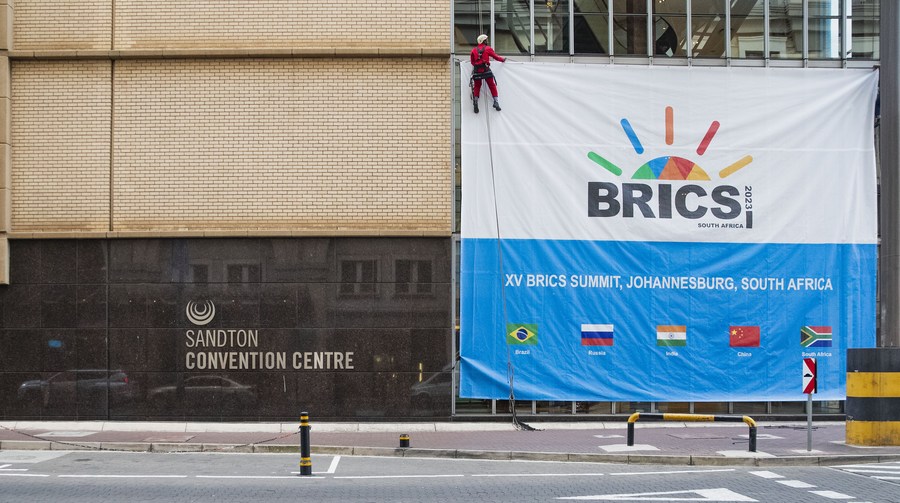Bloc people-centered, comprehensive: Expert
By EDITH MUTETHYA in Johannesburg, South Africa | China Daily Global | Updated: 2023-08-28 09:21

A leading China expert in South Africa said the current BRICS is people-centered, not market-centered, hoping that the bloc is structured in a way that members agree on common issues.
David Monyae, director of the Center for Africa-China Studies at the University of Johannesburg Confucius Institute, said the bloc, in its present form, lays emphasis on development.
Jim O'Neil created the acronym BRIC in 2001 when he was working for Goldman Sachs as a chief economist. He found Brazil, Russia, India and China to be on a similar stage as emerging economies.
Leaders of the four countries held their first summit in 2009. South Africa joined the group in 2010.
Monyae said the "current BRICS is people-centered, not market-centered". BRICS is much more comprehensive, he said, adding: "You cannot have BRICS as an elite club of the Global South."
Monyae said he wishes that BRICS would think beyond elites, open to others and be structured in a way that members agree on common issues.
"We need to be very clear and understand what we are doing. The moment we understand these concepts and think them through, it becomes easier to find criteria in which to admit (new) members," he said.
Argentina, Egypt, Ethiopia, Iran, Saudi Arabia and the United Arab Emirates were invited at the just-concluded Johannesburg summit to join BRICS as full members from Jan 1 next year.
Monyae said it is a question of sharpening the areas of convergence such as fighting poverty, increasing trade, infrastructure connectivity, understanding pandemics and peace-building.
Monyae said Chinese President Xi Jinping's speech at the summit was historic and unlike the rest, it offered practical solutions.
President Xi suggested ensuring the global value chain is not biased toward a particular country, but is shared by all, Monyae said. This is in addition to ensuring the currency system is democratic and inclusive.
President Xi looks at the entire Global South, he said.
"BRICS is playing a catalytic role in bringing to life the wishes and aspirations of the Global South."
Monyae said the idea proposed by President Xi on digital education and innovation as well as sharing satellite sensing is critical. "Satellite sensing will give the Global South early warnings on disasters, help them in agriculture and other areas, including trade," he said.
Monyae said: "When it comes to sea and space among other areas, it's the wild, wild West — it's the he or she who has a big gun who dictates everyone else."
"This is not the international relations we want. We want one where there is consensus, inclusivity. You bring everyone on board, and this is a good start by President Xi," he said.
"I think it will gain momentum, particularly in Africa, where we wish our people should also go to space and learn. We can't be left behind because we are poor."
Spirit of inclusiveness
Monyae lauded President Xi's call for BRICS countries to champion the spirit of inclusiveness, advocate peaceful coexistence and harmony between civilizations, and promote respect for all countries who independently choose their modernization paths.
Within the BRICS setting, it is just a question of uniting, and bringing together universities, he said. "People carry with them their traditions, values and civilizations. So, for you to have harmony, you need to learn from other civilizations," he said.
Monyae praised President Xi's call for international rules to be written and upheld jointly by all countries based on the purposes and principles of the UN Charter, rather than be dictated by those with the strongest muscle or loudest voice.
What's happening currently, he said, is a selective way of applying international law.
Monyae said many countries are unhappy with the current world order. When it was born in 1945, the bulk of countries in Africa were not part of the United Nations system.
"We are not anti-America, we are not anti-West, we are anti-bully, we are anti-hegemonic. We are not anti-dollar, we are for more currencies so that we have a choice," he said.
"We need much more representation, we need more democratization of institutions of global governance, reform of the UN Security Council and the UN agencies. It can't be that the presidents of the International Monetary Fund and the World Bank are Americans and Europeans, we need a shift and fair change."
edithmutethya@chinadaily.com.cn
























